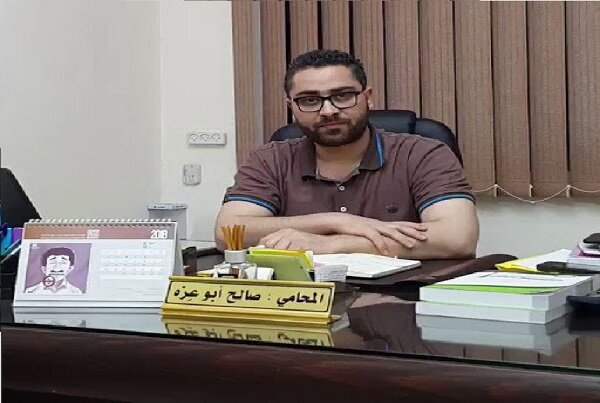People angry with Palestinian Authority’s security coordination with Israel: lawyer

TEHRAN – The public is unhappy with the Palestinian Authority’s security coordination with Israel, a Palestinian lawyer says.
“There is real awareness among the Palestinian public of the need to change the behavior of the Palestinian Authority,” Saleh Abou-Izzah tells the Tehran Times.
“Palestinians through their parties, institutions, associations, gatherings and popular movements have expressed their rejection of the practices of the Authority in Ramallah, especially with regard to security issues, whether in its dealings with the Palestinian people, or its coordination with the Israeli occupation,” the lawyer, who was jailed by Israel, explains.
People expressed their resentment in the streets after the killing of activist Nizar Banat by security forces attributed to the Palestinian Authority.
Mahmoud Abbas, the Palestinian Authority president, has also killed any hope for reform as he cancelled the planned election.
“The Palestinian people had hoped for reforms to be made through the elections, so more than 35 blocs were formed to participate in the Palestinian elections, but President Mahmoud Abbas canceled it,” notes Abou-Izzah.
Following is the text of the interview:
Q: Could you update us about the “unnatural death” of the Palestinian political and human rights activist, Nizar Banat? What is the role of the Palestinian Authority in the incident?
A: There are two main narratives that circulate among the Palestinian people; The first is that what happened with the martyr Nizar Banat is an intentional assassination by the Palestinian security services, and this narrative is adopted by most of the Palestinian people, including the Palestinian parties, political activists, and the martyr’s family.
As for the narrative of the Palestinian Authority and the Fatah movement, the activist died during his arrest by security forces in the occupied West Bank city of Hebron. He was subjected to physical violence and beating.
Despite the fundamental difference between the two narratives, it remains a crime that shook the Palestinian people and the political parties that viewed the matter as a threat to the lives of activists, lawyers, journalists and opponents in general.
Q: How do you read the events that followed the killing of Nizar Banat, especially the suppression of popular protests in many Palestinian cities and the attack on journalists who tried to cover the events by beating, breaking and confiscating their equipment?
A: There is no doubt that the security services of the Palestinian Authority in Ramallah were not satisfied with this extent of crime (assassinating Nizar Banat), but they resorted to suppressing the peaceful demonstrators who took to the streets in solidarity with Nizar and his cause demanding the authority to hold the killers and perpetrators of the crime accountable.
This is another crime in addition to the murder of Nizar Banat. The authority ignores popular demands for investigation, accountability, and refuses to dismiss some officials in the security services.
This has angered the Palestinian public, and the people consider it a double insult to all Palestinians, once through the crime of killing Nizar, and once again through the crime of attacking those who supported Nizar in the streets.
Q: How do the Palestinians view the policies and performance of the Authority that rules in their name but is in coordination with their enemy in matters of security and military?
A: The Palestinian people are dissatisfied with the performance of the Palestinian Authority in Ramallah, especially its security performance. The people reject security coordination that besieges the legitimate Palestinian resistance. This coordination leads to the occupation’s pursuit of Palestinian activists.
The people also reject the practices of the security authority, such as its detention of journalists, lawyers and political activists. What the Palestinian Authority is doing is immoral and against the national interests of Palestine that affects the Palestinian people's identity, history and resistance.
Q: What are the repercussions of the recent Israeli aggression on Gaza? And how did it lay bare Israel’s approach toward the press and freedom of expression?
A: Israel has practiced and still is continuing oppression against the Palestinians in all fields, before and after the recent battle in Gaza.
This regime has never stopped its crimes against the Palestinian people at any moment. But after the last war, Israel looked at the danger of the media in undermining its narrative, so it arrested thousands of Palestinians in Jerusalem, the West Bank and the occupied interior. Israel is fighting the people and their media as well.
Q: Is there a glimmer of hope to change the situation in the occupied regions? Is there a popular movement or an increase in public awareness of the reality of Israeli occupation?
A: There is real awareness among the Palestinian public of the need to change the behavior of the Palestinian Authority. Palestinian through their parties, institutions, associations, gatherings and popular movements have expressed their rejection of the practices of the Authority in Ramallah, especially with regard to security issues, whether in its dealings with the Palestinian people, or its coordination with the Israeli occupation.
The Palestinian people had hoped for reforms to be made through the elections, so more than 35 blocs were formed to participate in the Palestinian elections, but President Mahmoud Abbas canceled it.
Political activities are still going on, and they will continue without stop because there is a popular consensus for change.
But this change will not happen soon for more than one reason, and one of the most important of these reasons is the people’s fear of any civil war or great strife which may end in bleeding, and distract the world’s attention from the occupation.
On the other hand, just as popular movements have a pivotal role in the political scene, there is a role entrusted to the parties to boost solidarity of all Palestinian sides to make changes that help the people, their rights and resistance.
Leave a Comment